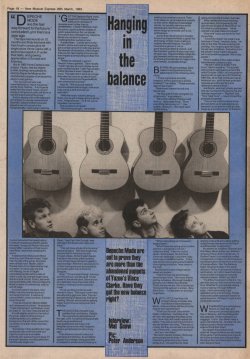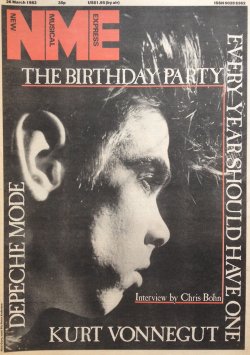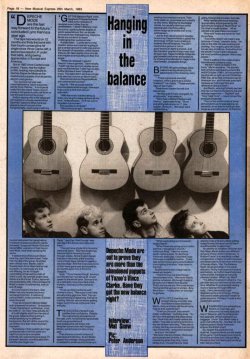Hanging In The Balance
[NME, 26th March 1983. Words: Mat Snow. Pictures: Peter Anderson.]

HANGING IN THE BALANCE
“Depeche Mode are the fast way forward to the future,” concluded Lynn Hanna a year ago. [1]
The tape has wound on 12 months and finds the band with their fourth consecutive hit single since Vince Clarke left, a second successful LP under their belts, and growing appreciation in Europe and America.
But in 1982 Vince Clarke’s new project, Yazoo, had the higher profile, leading many people to dismiss Depeche Mode as the abandoned puppets of an eccentric electro-pop genius.
“Our success last year was overshadowed by Yazoo’s success,” admits Andy Fletcher. “A lot of people really think we resent Yazoo. A lot of people in the general public still think he was the brains behind the group.”
Andy is sipping milk in the restaurant of Frankfurt’s curiously named Hotel Splendid. Depeche Mode have just played a one-off concert at the Kongresshalle, neatly tying in with the musical instrument fair being held at Frankfurt’s massive exhibitions centre that week. Songsmith Martin Gore and Daniel Miller, supremo of their record label Mute, have been sampling the wares.
In appearance Andy is part Shed boot-boy, part Okie farm-hand. Taller than the rest of the group, he is their semi-official voice. Martin, clad in Russian tank-driver black leather cap and jerkin, is notoriously shy and self-effacing, his air of fragile vulnerability enhanced by a halo of infant’s curls. By contrast singer Dave Gahan is a bit of a lad. Pushy, extrovert and exuberantly witty, Dave is Depeche Mode’s master of ceremonies, both on and off stage.
At 23 the oldest in the band, Alan Wilder has only recently become a permanent member. A veteran of various North London combos, Al joined when Vince left.
“They advertised in Melody Maker and I answered the advert,” he explains. “It said, Name band, synthesiser, must be under 21. So I lied, I was actually 22.”
Al is still slightly aloof from the rest of the group, debarred from joining in wholeheartedly by his different background. But with all the zeal of the converted, he is their most trenchant champion.
“Somebody in their position doesn’t get somebody new in the first week who might turn out to be a complete arsehole. So I was touring and doing TV but wasn’t actually recording with them until this new single now.”
“Get The Balance Right” is the toughest 45 Depeche Mode have so far released. It deviates even further than its predecessor, “Leave In Silence”, from the sunny, sparkling Mode singles of public expectations. But, as stylistic innovators from the beginning, Depeche Mode are not about to cease challenging their audience now.
Al elaborates: “Luckily we’re in the position where we know we’re going to get a certain amount of radio play just on the strength of reputation, which means that you can take slightly more of a risk than maybe a band putting out their first single.”
“When we released ‘Leave In Silence’ it was a gamble,” Dave recalls. “It didn’t get nearly as much airplay as our past records had got. It didn’t go as well, but the fact was it wasn’t played as much. The radio didn’t see it as a single; they saw it as more of an album track.”
How concerned are Depeche Mode with commercial success?
Says Al: “We obviously want to become established enough, if we want, to go out on a limb and vary our approach.”
“With the music industry being so fickle, you’ve got to keep up there all the time,” Andy stresses. “Or if not, you’re forgotten in a moment.”
And success in America?
“We’ve done all right, “ comments Dave. “’Just Can’t Get Enough’ was very big in the discos and clubs over there.”
“You can have a fluke hit in America,” expounds Dave. “Our new single may become a hit in America but only through a fluke. All the English bands that are in the charts at the moment, none of them have followed it up with a second single. And that’s because none of them have gone over and toured for six months apart from A Flock Of Seagulls.”
Andy: “To be honest though, America isn’t the end, isn’t our aim at all. I trust I speak for the whole band. Germany for us is definitely more important at the moment. Germany is the market to break.”
“It’s an exciting market as well,” chimes in Dave. “We enjoy it over here, actually doing gigs over here. You can see something’s happening, that we’re building. We can see ourselves getting bigger every time we come over here and play.”
The success of tonight’s gig justifies their confidence. Despite the unpromising atmosphere of the vast, overlit, functional Kongresshalle itself, a large audience of post-pubescents are drawn into delighted communion with Depeche Moe’s symphonies for kids (of any age).
Their show is a careful mixture of spectacle and intimacy. Al and Martin appear first onstage, being gradually enveloped in smoke as they brew up a swirling instrumental overture. Then Andy walks on, as amiable and unstuffy as they come. Belying his backstage nerves, he casually switches on the backing tape-machines sitting centre-stage as he strolls over to his synthesisers.
Just by that casual press of a button he sums up Depeche Mode’s appeal; the technology of their music-making is instantly demythologised. You don’t have to be a genius or rich or good-looking to stand a chance. Just like that other quartet of boys-next-door twenty years ago, Depeche Mode bridge the gap between performer and audience by showing the potential for magic in the most familiar, accessible things.
Before he goes onstage, Dave makes final adjustments to his appearance in the dressing-room mirror:
”There’s gonna be a borstal breakout, there’s gonna be a borstal breakout!” he chants. “Those were the days of real music.”
[NME, 26th March 1983. Words: Mat Snow. Pictures: Peter Anderson.]
All round band interview catching the band on tour, at a time when their sound was just beginning to change for the darker. The author picks up on how the band have been around long enough not to be a flash in the pan, and on the heavier feel to their most recent two singles, and wisely links the two.
" “Luckily we’re in the position where we know we’re going to get a certain amount of radio play just on the strength of reputation, which means that you can take slightly more of a risk than maybe a band putting out their first single.” "
Summary: All round band interview catching the band on tour, at a time when their sound was just beginning to change for the darker. The author picks up on how the band have been around long enough not to be a flash in the pan, and on the heavier feel to their most recent two singles, and wisely links the two. [1707 words]

HANGING IN THE BALANCE
“Depeche Mode are the fast way forward to the future,” concluded Lynn Hanna a year ago. [1]
The tape has wound on 12 months and finds the band with their fourth consecutive hit single since Vince Clarke left, a second successful LP under their belts, and growing appreciation in Europe and America.
But in 1982 Vince Clarke’s new project, Yazoo, had the higher profile, leading many people to dismiss Depeche Mode as the abandoned puppets of an eccentric electro-pop genius.
“Our success last year was overshadowed by Yazoo’s success,” admits Andy Fletcher. “A lot of people really think we resent Yazoo. A lot of people in the general public still think he was the brains behind the group.”
Andy is sipping milk in the restaurant of Frankfurt’s curiously named Hotel Splendid. Depeche Mode have just played a one-off concert at the Kongresshalle, neatly tying in with the musical instrument fair being held at Frankfurt’s massive exhibitions centre that week. Songsmith Martin Gore and Daniel Miller, supremo of their record label Mute, have been sampling the wares.
In appearance Andy is part Shed boot-boy, part Okie farm-hand. Taller than the rest of the group, he is their semi-official voice. Martin, clad in Russian tank-driver black leather cap and jerkin, is notoriously shy and self-effacing, his air of fragile vulnerability enhanced by a halo of infant’s curls. By contrast singer Dave Gahan is a bit of a lad. Pushy, extrovert and exuberantly witty, Dave is Depeche Mode’s master of ceremonies, both on and off stage.
At 23 the oldest in the band, Alan Wilder has only recently become a permanent member. A veteran of various North London combos, Al joined when Vince left.
“They advertised in Melody Maker and I answered the advert,” he explains. “It said, Name band, synthesiser, must be under 21. So I lied, I was actually 22.”
Al is still slightly aloof from the rest of the group, debarred from joining in wholeheartedly by his different background. But with all the zeal of the converted, he is their most trenchant champion.
“Somebody in their position doesn’t get somebody new in the first week who might turn out to be a complete arsehole. So I was touring and doing TV but wasn’t actually recording with them until this new single now.”
“Get The Balance Right” is the toughest 45 Depeche Mode have so far released. It deviates even further than its predecessor, “Leave In Silence”, from the sunny, sparkling Mode singles of public expectations. But, as stylistic innovators from the beginning, Depeche Mode are not about to cease challenging their audience now.
Al elaborates: “Luckily we’re in the position where we know we’re going to get a certain amount of radio play just on the strength of reputation, which means that you can take slightly more of a risk than maybe a band putting out their first single.”
“When we released ‘Leave In Silence’ it was a gamble,” Dave recalls. “It didn’t get nearly as much airplay as our past records had got. It didn’t go as well, but the fact was it wasn’t played as much. The radio didn’t see it as a single; they saw it as more of an album track.”
How concerned are Depeche Mode with commercial success?
Says Al: “We obviously want to become established enough, if we want, to go out on a limb and vary our approach.”
“With the music industry being so fickle, you’ve got to keep up there all the time,” Andy stresses. “Or if not, you’re forgotten in a moment.”
And success in America?
“We’ve done all right, “ comments Dave. “’Just Can’t Get Enough’ was very big in the discos and clubs over there.”
“You can have a fluke hit in America,” expounds Dave. “Our new single may become a hit in America but only through a fluke. All the English bands that are in the charts at the moment, none of them have followed it up with a second single. And that’s because none of them have gone over and toured for six months apart from A Flock Of Seagulls.”
Andy: “To be honest though, America isn’t the end, isn’t our aim at all. I trust I speak for the whole band. Germany for us is definitely more important at the moment. Germany is the market to break.”
“It’s an exciting market as well,” chimes in Dave. “We enjoy it over here, actually doing gigs over here. You can see something’s happening, that we’re building. We can see ourselves getting bigger every time we come over here and play.”
The success of tonight’s gig justifies their confidence. Despite the unpromising atmosphere of the vast, overlit, functional Kongresshalle itself, a large audience of post-pubescents are drawn into delighted communion with Depeche Moe’s symphonies for kids (of any age).
Their show is a careful mixture of spectacle and intimacy. Al and Martin appear first onstage, being gradually enveloped in smoke as they brew up a swirling instrumental overture. Then Andy walks on, as amiable and unstuffy as they come. Belying his backstage nerves, he casually switches on the backing tape-machines sitting centre-stage as he strolls over to his synthesisers.
Just by that casual press of a button he sums up Depeche Mode’s appeal; the technology of their music-making is instantly demythologised. You don’t have to be a genius or rich or good-looking to stand a chance. Just like that other quartet of boys-next-door twenty years ago, Depeche Mode bridge the gap between performer and audience by showing the potential for magic in the most familiar, accessible things.
Before he goes onstage, Dave makes final adjustments to his appearance in the dressing-room mirror:
”There’s gonna be a borstal breakout, there’s gonna be a borstal breakout!” he chants. “Those were the days of real music.”


